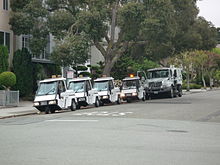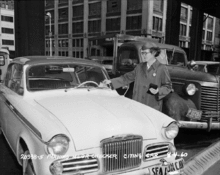- Parking violation
-
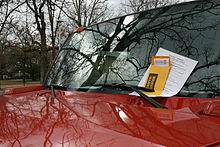 Parking tickets on a vehicle in Durham, North Carolina
Parking tickets on a vehicle in Durham, North Carolina
A parking violation is the act of parking a motor vehicle in a restricted place or for parking in an unauthorized manner. It is against the law virtually everywhere to park a vehicle in the middle of a highway or road; parking on one or both sides of a road, however, is commonly permitted. However, restrictions apply to such parking, and may result in an offense being committed. Such offenses are usually cited by a police officer or other government official in the form of a traffic ticket.
Contents
Examples
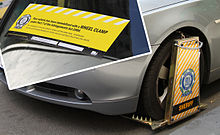 Vehicles may be wheel clamped for parking violations, such as this one in Melbourne, as a penalty or to enforce payment of fines
Vehicles may be wheel clamped for parking violations, such as this one in Melbourne, as a penalty or to enforce payment of fines
Parking violations include, but are not limited to:
- Parking in a prohibited space such as a bus stop or in front of a fire hydrant or a driveway or a garage entrance.
- Parking on a sidewalk (unless specifically allowed by signs)
- Parking in or too close to or within a street crossing, railroad crossing or crosswalk.
- Double parking
- Parking at a parking meter without paying, or for longer than the paid time.
- Parking in a handicapped zone without an appropriate permit.
- Many vehicle codes define it to be an infraction to park on the public byway without the vehicle being properly licensed and registered, with expired or missing license plates or license plate 'tabs', without proper safety vehicle inspection decal, etc.
- Parking without a zone permit in places where parking is severely impacted (such as a residential zone permit, issued to help preserve parking availability for those who live in the permit zone).
- Parking without special permit, where one is needed (like a parking for employees of a company)
- Parking with the parking permit or payment receipt not visible in the prescribed way, like upside down.
- Parking on certain streets in a snow emergency when streets need to be plowed of snow.
- Parking at curb locations designated (usually through signage and/or curb or pavement painting) for special purpose such as passenger zones (for loading and discharge), commercial vehicle zones (for freight or service trucks and vans), police or government vehicle zones, etc.
- Parking at locations during scheduled street sweeping.
- Parking at locations during posted construction or maintenance operations.
- Parking for longer than the maximum time, often that is 24 hours.
- Parking facing against the direction of traffic (considered confusing to moving drivers, especially at night)
- Parking outside marked squares, for example angle parking where only parallel parking is allowed.
United States
In 1926 American merchants listed downtown traffic congestion as their most serious difficulty. Unenforced curbside parking and lack of off-street parking facilities were listed as the primary problems. Customers went where they could park.
During the great depression city revenues dwindled. With parking meters, however, a new source of municipal revenue was found. Not only did the nickels paid in by parkers accumulate, but so did the fines imposed for over parking. By 1944, American cities were generating some $10 million annually from parking meters alone. Soon after came meter maids who, because they were paid less than police officers, increased city revenues further. Complex parking rules, restrictions and regulations are now an integral part of modern life and landscape.
Typically a ticket is placed on a vehicle when the owner or driver is not present. There is no place for a signature, and in California the registered owner cannot be charged with a misdemeanor or other criminal offense for ignoring a ticket. A letter will usually be sent prior to any punitive action. Most jurisdictions, however, will have sanctions such as refusal to allow renewal of license plates if the owner of the vehicle has unpaid parking tickets. In some jurisdictions, such as New York City, a vehicle may be towed if it has overdue parking fines exceeding a specified balance and subjected to impounded vehicle auction if unredeemed. In many jurisdictions, such as Boston, vehicles with numerous outstanding parking citations are subject to booting.
- No Parking Signs
-
No parking, MUTCD R7-1.
-
No parking, Caltrans R-28.
-
No parking, NYSDOT NYP1-2.
-
No parking, PADOT R7-7A.
-
No parking with restrictions and localized, NYCDOT SC-346C.
-
"Don't even think of parking here" sign, NYCDOT.
Europe
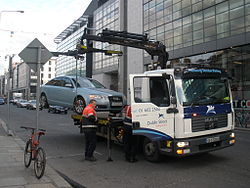 Car being towed in Ireland
Car being towed in Ireland
In Europe, parking tickets are also heavily used. In Sweden, parking violations on street are considered traffic crimes with a fine. If the fine is not objected or paid within a specified time, the Swedish Enforcement Administration will claim money from bank accounts or other assets, relatively fast. The owner will be noted as a bad payer, and will not get a loan or a new rental apartment etc for three years.[citation needed] A parking violation on a parking place (not on the street) is considered a break of contract which results in a penalty fee with different rules. According to statistics from Stockholm the cars with the highest number of parking violations (weighted for number of cars) is Jeep, Mercedes-Benz, Porsche and Lexus. The greatest arrogance is found in Mercedes owners who are in the top of parking in handicap spaces. According to Professor Gunnar Aronsson at the department for psychology at Stockholm university it is probably due to the owners being well-off and thinking that their time is more important.[1][2] According to Jan Prestberg at the traffic office in Stockholm the fines are low enough to be ignored by richer people [3]. It is often hard to find parking spots in big cities. After wheel-locks were introduced in London, the prices for rented parking spots went up considerably.
Foreign-registered vehicles in Europe in reality can not be fined. This is partly because it is too much work to find the owner in a foreign country, but mainly because it is not legally possible to claim money from a foreign resident person if they don't pay voluntarily.[citation needed] The European Union is introducing legislation into all member countries to collect fines across borders. In some cities, like London, this has been solved by locking one wheel of a falsely parked vehicle. The driver has to pay to be able to drive.
Australia
Parking fines were introduced in the 1950s in New South Wales, Australia. At that time, council rangers only worked in council car parks and parking fines on the streets, mainly in Sydney were issued by the NSW Parking Police. These were employees of the NSW Police Department. Up until about 1995, these fines were issued and processed by the NSW Police and the fines were processed by the traffic penalties section of the police. This section was mostly staffed by clerical staff employed by the police department, however they were not members of the police force. If fines were unpaid, the courts could decide on a penalty, and if then unpaid, a warrant would be made out and a person could spend time in gaol to cover the amount of the fine. Now the system is different with the State Debt Recovery Office handling the fines.
Ancient Assyria
Possibly the first parking restrictions were put in place in Nineveh, the capital of ancient Assyria in c.700 BC. The restrictions are due to their king Sennacherib (704 to 681 BC) and pertained to the sacred main processional way through Ninevah. The oldest parking signs ever discovered read "ROYAL ROAD - LET NO MAN DECREASE IT". The penalty for parking a chariot on this road was death followed by impaling outside one's own home.[4][5]
See also
Gallery
-
Parking ticket from Arlington County, Virginia.
-
Placement of parking citation from Huntington Beach, California.
-
A GT illegally occupying two parking spaces at Vaughan Mills mall, Ontario.
References
- ^ Metro: Porscheägare i topp bland felparkerare
- ^ Nyheterna.se: Lyxbilar parkeras oftare fel än andra
- ^ Svenska Dagbladet: Bilarna som felparkerar oftast
- ^ L. Sprague de Camp, Ancient Engineers, p 71, Tandem Publishing 1977 ISBN 0426181204.
- ^ Joseph C. Ingraham, Modern traffic control, p18, Funk & Wagnalls, 1954.
See also
Categories:- Parking law
- Vehicle law
Wikimedia Foundation. 2010.

